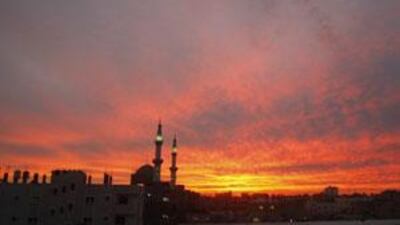NAZARETH // The biggest effect for Israel's 1.3 million Palestinian citizens of its assault on Gaza last winter has been to smash any remaining illusions that there is a future for the minority in a Jewish state, the community's leaders have agreed. They say that minority voters have almost completely abandoned Zionist parties, even left-wing ones, believing that none is really interested in a peaceful solution to the country's conflict with the Palestinians.
That was reflected in February, one month after Operation Cast Lead ended, in the lowest turnout ever posted by the Palestinian minority in an election. Only 53 per cent voted, down more than 25 percentage points since the mid-1990s, in the more optimistic Oslo period. Haneen Zoubi, who was elected to the Israeli parliament for the first time in 2009, pointed out that the minority's share of the vote for Jewish parties had fallen to an all-time low of 17 per cent. Back in the early 1990s half of Israel's Palestinian voters supported such parties.
"More and more Palestinian citizens are understanding that Israel is not serious about negotiations for peace," she said. "People are disillusioned with a leadership that is simply trying to buy time and manage the conflict rather than solve it." That view was shared by Mohammed Zeidan, director of the Arab Association for Human Rights, based in Nazareth. "We need a new way of dealing with Israel. The two-state solution is starting to look impractical and that has given a significant push to the idea that Palestinians inside Israel should be campaigning for a single state for both peoples."
This new-found political confidence was manifest during the Gaza incursion, Mr Zeidan said, when Palestinian citizens held the biggest protests in their history. The largest, in the northern city of Sakhnin, drew a crowd of at least 100,000. "There is much more certainty among the Palestinian public and leadership inside Israel that it has a right to speak out on pan-Palestinian issues," he said. "Once, we tended to remain on the sidelines, waiting to take our political cues from the Palestinian leadership outside Israel. Now, the Palestinian Authority is seen to be damaging the popular consensus among Palestinians and people here are looking for their own answers."
One Palestinian party, the National Democratic Assembly, even went so far as to call for the resignation of Mahmoud Abbas, the Palestinian president, during the attack on Gaza after his Palestinian Authority was seen to be suppressing dissent in the West Bank. Ms Zoubi, a NDA member, said: "It was clear that Israel would have had a much harder time dealing with the fallout from Gaza, including the Goldstone report, were it not for the silence of Mahmoud Abbas. He is facing a lot of anger and criticism from Palestinians inside Israel."
Jafar Farah, director of Mossawa, a Haifa-based advocacy group for the minority, said last year's attack had led directly to the current government of Benjamin Netanyahu, one of the most right wing in Israel's history. "Ever since, we have seen an attack on freedoms and the rights of Palestinian citizens," he said. "There have been at least 25 discriminatory laws proposed over the past six months. Most have yet to be approved but the implications of the legislative push are clear."
@Email:foreign.desk@thenational.ae


